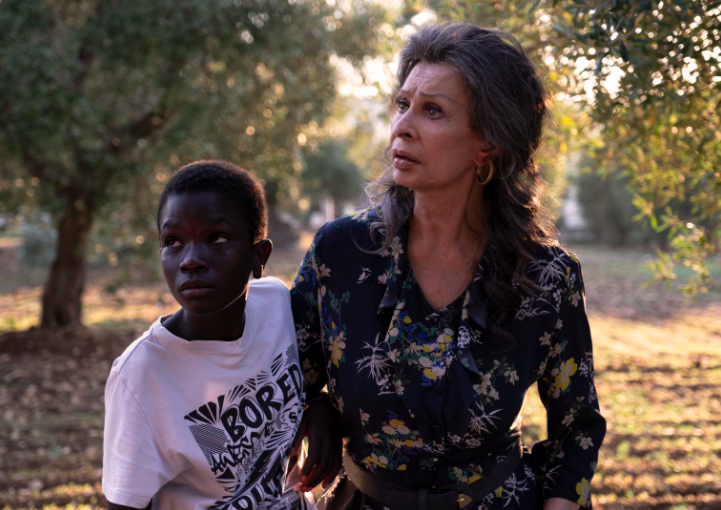|
By Nadia Dalimonte Ibrahima Gueye and Sophia Loren in The Life Ahead (2020) Sophia Loren returns to the screen with a spellbinding performance in The Life Ahead, a resonating film about trauma, acceptance, and the need for formative teachers in life. This is a performance of vitality and fragility that is so breathtakingly lived-in. Her face is a canvas of the life her character has lived. Her expressions are a stunning portal to emotional moments that come and go in waves, as her character’s health sees a slow decline. It’s not hard to savour every moment of Loren’s work as she plays her first role in decades, and a leading one at that. Given the combined tenacity and compassion of her character, it’s a treasure that this was the role to lure her back onto the screen. The camera is magnetically drawn to her majestic presence, to no surprise and to compelling delight.
The Life Ahead marks the third collaboration between Loren and her son, director Edoardo Ponti (first the feature Between Strangers in 2002, followed by the short film Human Voice in 2014). Set in seaside Italy, Ponti brings a devoted lens to the story of Holocaust survivor and former sex worker, Madame Rosa (Loren), as she reluctantly takes in an ambitious 12-year-old Senegalese boy, Momo (Ibrahima Gueye), who is just as reluctant to be placed under her care. The two have a shared unfortunate history that harks back to the beginning of the film. Momo, studying a crowd of people shopping at a street market, fixates on an elderly woman carrying a bag full of antiques. Not just any antiques…she intends to sell them in exchange for rent. Spotting her vulnerability, he steals her bag and stores it away. The doctor he lives with discovers the bag and brings Momo to Madame Rosa’s apartment, a refuge for children of sex workers. Momo is made to return the bag and apologize to Rosa. But the underlying reason for this visit would soon change the course of the characters’ lives ahead. Doctor Coen (Renato Carpentieri) pleads with an insulted Rosa that she do him a favour and care for the boy, just for a few weeks. Otherwise he’ll be placed with child services. She agrees after much convincing, and Momo joins two children of immigrant women. Friendly neighbor Lola (Abril Zamora), mom to one of the two children, stops by on occasion to check in. Zamora is trans and plays a trans woman, which is refreshing for that reason (especially given very troubling Hollywood representations) in addition to the fact that her being trans doesn’t become a talking point in the narrative. She just is. The first bit of the film sees Rosa and Momo keeping to themselves, each harboring the residue of their pasts and resisting opportunities to bond. Momo keeps busy mostly outside trying to make a living from dealing drugs, while Rosa has her hands full trying to make a living by raising three children. Rosa’s firmness and Momo’s stubbornness clash, but what begins as an antagonistic relationship develops into a friendship, as the two lonely souls discover through unexpected bonding that they are kindred spirits. Their shared connection peels back the layers of the characters’ life stories and gives the film wings. Edoardo Ponti adapted the story from Romain Gary’s best-selling novel, and one of the most well-known in French literature, The Life Before Us. Ponti changes the original setting of Paris to the Italian port city of Bari, translating themes about who and what gives life meaning. The evolving definitions of home and family are explored through internal observations and reflections from the film’s protagonist, Momo. The story is told from his perspective in the heart of Bari, where he tries to find a sense of place among a labyrinth of unwelcoming settings. One of the reasons Doctor Coen persuades Madame Rosa to take Momo in is because the boy, who we learn is an orphan, doesn’t have a nurturing figure in his life. His childhood is quickly maturing from his surroundings and circumstances. In the place of his mother, who died when he was 6, he has visions of a protective lioness that he conjures up when he feels the most vulnerable. The lioness appears at two key moments in the film - once in close proximity and again from a distance, evoking the growth of his character. In his first feature film role, actor Ibrahima Gueye has the task of going toe-to-toe with the legendary Sophia Loren, and he’s remarkably nuanced. He has winning chemistry with Loren and carries the film with an instinctive expression, fulfilling a crucial nucleus for the story as his character is at the heart of it (particularly in the second half). Momo’s protective lioness bears strong parallels to Madame Rosa’s secret den, a hidden safe space in her building that she retreats to when she feels overwhelmed by growing PTSD from her experiences in Auschwitz. She also suffers from early dementia, which freezes her in paralyzing spells. Rosa has a strong determination to keep these experiences to herself, even though on more than one occasion Momo and the other children discover her in a worrying state. The film is a powerful exploration of two people carrying a lot of emotional weight and, through a strongly shared kinship, learn to open their hearts. The director has an acute understanding of the level of patience needed to bring this bond onto the screen in a way that feels inherent rather than rushed or forced. The final result is helped by stunning work from Loren and Gueye, plus their remarkable chemistry that makes the destiny of their characters especially moving to watch. The Life Ahead is releasing November 13th exclusively on Netflix.
0 Comments
Leave a Reply. |
Archives
June 2024
Categories |


 RSS Feed
RSS Feed